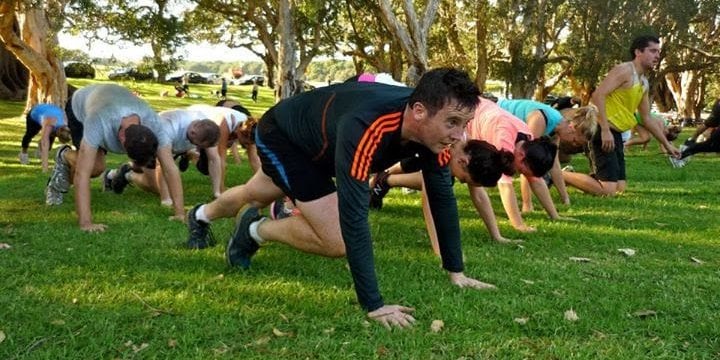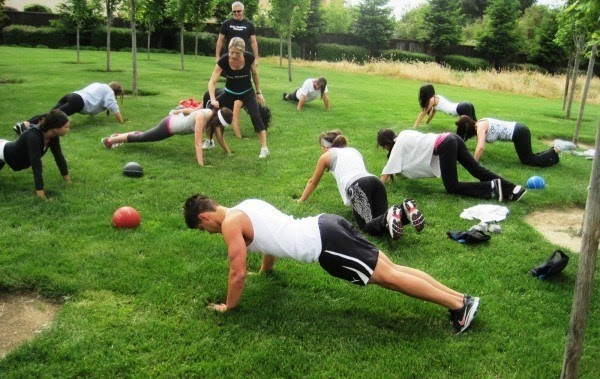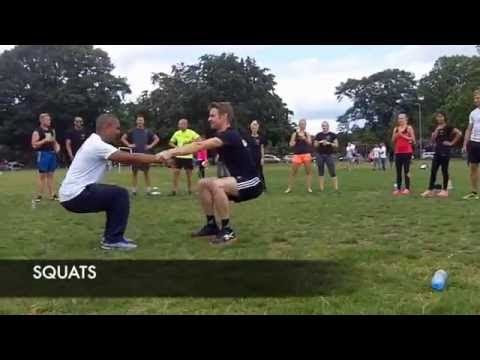Bootcamp training, as the military-sounding name might suggest, is a program blending traditional calisthenics with body weight and strength training as well as interval training. These camps are hugely popular as team-building exercises. More strenuous bootcamps appeal to athletic-minded individuals who are already in good shape and want to test themselves to the limit. Participants report that the training encourages the mind to work with the body as motivation. As a result, instructors play a vitally important role in the success of Bootcamp students.
This is because you’re not just an instructor. You become a guiding force and a motivator, pushing students to hit their goals. If that sounds like a terrific career, read on.
Bootcamp training is almost always an outdoor group exercise, concentrating on cardiovascular fitness and building strength. Bootcamp programs typically last 4 weeks. During that time you and your students will get to know each other, and that interaction will help you help them become their best selves.
Here’s what you’ll learn in this article:
- How Much You Can Make
- Training and Certification Requirements
- Costs
- Career Options
- Finding Clients
- Helpful Tips for Bootcamp Instructors
Bootcamp is a generic name for a style of exercise program. Other common names to describe essentially the same format include:
- Adventure bootcamps
- Extreme fitness camps
- Exercise camps
- Lifestyle camps
Then there are bootcamps marketed to specific groups or interests. These include:
- General fitness boot camps
- Sports-specific boot camps (skiers, runners, cyclists, for example)
- Women-only fitness bootcamps
- Bootcamps for kids
- Weight loss bootcamps
- Bootcamps for brides
- Boot camps for seniors
You might even come across dramatic-sounding course names like Gladiator Bootcamp and Cardio Shredder. It’s still a variation of a bootcamp.
How Much You Can Make?
The national average salary for a Bootcamp instructor is $59,555 a year, according to ZipRecruiter. That breaks down to almost $30 an hour. Bootcamp instructors on the high end of the salary range can make six figures.
Here’s a state by state guide to personal trainer salaries for comparison.
Training and Certification
Because Bootcamp training is not a copyrighted or trademarked enterprise, there is no specific certification requirement to run a Bootcamp course. Any physical fitness trainer can open a business and advertise for Bootcamp instruction targeting any market they like. At the same time, there are a number of physical fitness organizations that do offer Bootcamp certification through programs that teach best practices.
This is potentially an area where you can differentiate yourself with prospective clients.

A personal trainer with Bootcamp certification listed prominently on their website may be more likely to attract students looking for this type of training program. Training as a bootcamp instructor involves mastery of several forms of plyometric (jump training) and interval training. These include:
- Speed training (sprinting)
- Squats
- Squat thrusts
- Lunges
- Jumping jacks
- Planks
You’ll also learn principles of motivation and encouragement, how to foster teamwork in a group and create an environment of camaraderie and cooperation. These are vital skills to the success of everyone in the bootcamp group, as you will all be together over a period of weeks.
Although the name “bootcamp” might conjure images of a merciless military instructor, the goal of a bootcamp instructor is to inspire, not intimidate. Students will be paying you and investing their time to be uplifted, not berated.
Still, before accepting students into a bootcamp session, a skilled instructor should verify each student is up to the task. Developing these skills will be a part of your own training in bootcamp instruction.
This video features a broad range of bootcamp exercises and activities to give you an idea of the scope.
Fitness bootcamps usually appeal to people looking for a more intense workout, according to the Mayo Clinic. But it’s important to understand that bootcamp exercises may be too challenging to those who aren’t already in good physical health.

People who have a strong foundation of strength and aerobic training are probably ready for a bootcamp experience. Before admitting students, a good bootcamp instructor will take precautionary steps, including a physical assessment of each student’s abilities and potential for success, given the demands of the program.
Individuals 40 and older, or are pregnant, haven’t exercised for some time or have underlying health conditions should get clearance from a doctor before participating in a bootcamp. It’s an instructor’s responsibility to be aware of these issues and recognize potential problems before enrolling students.
Because the success of a bootcamp often depends on the instructor, you’ll learn more than whole-body fitness routines. You’ll also discover how to challenge participants to work hard while building their self-esteem and confidence. Leading and managing people effectively are vital skills for a bootcamp instructor. You must be able to inspire your students.
Your training should also include information on how to set a budget for a bootcamp program, knowing what equipment and materials will be needed, as well as legal considerations such as insurance requirements, safety measures and injury indemnification forms (if someone gets injured, they’ve agreed in advance not to hold you responsible, which could otherwise potentially put you out of business).
Costs
These sports and physical fitness organizations offer specialty certification in bootcamp training:
National Academy of Sports Medicine, Group Personal Training Specialist
NASM membership currently costs between $524 and $2,400 depending on the type of certification.

National Exercise and Sports Trainers Association, Adventure Bootcamp
The requirements to apply for this program include:
- At least 6 months of experience as a fitness professional, instructing or coaching at least 20 hours per week.
- A personal trainer or group fitness certification or a degree in a health or sports science field.
- The cost of the certification program is $900.
The Adventure Bootcamp boasts 300 certified coaches operating more than 400 bootcamp locations in 9 countries.
American Council on Exercise (ACE)
FiTOUR, Boot Camp Fitness Certification
This budget at-home study and certification program is designed for group fitness instructors and personal trainers. The program provides the tools needed to design, market, develop and conduct Bootcamp training. You’ll also learn how to set up your own Boot Camp business. The cost is $80.
Career Options
Bootcamp instructors typically start out working for a company that offers this unique form of physical fitness training. During their bootcamp experience, your students may live on-site at the training facility or perhaps stay in nearby hotels. The expense of opening a bootcamp training center is why most new instructors begin by working for someone else before venturing out on their own.

Some gyms conduct bootcamps on a monthly or quarterly basis. Check the facilities in your area to see who’s offering a bootcamp experience – and who they’re catering to. An adventure bootcamp won’t be the same experience as a weight loss bootcamp. The choice is yours, depending on who you want to teach and your own professional goals.
Finding Clients
- Create and memorize a sales script that overcomes common client objections such as time commitment, cost, fear of injury and any other student pain-points you’ve encountered as a trainer. It’s easier to sign clients with a consistent sales pitch rather than reinventing the wheel every time you meet with someone new.
- Provide incentives such as discounts for new students, a special deal for repeat customers and a price break for existing students who bring referrals.
- Promote your Bootcamp across all social media platforms, with online booking links and links to your business website.
- Ask your best clients to post a review of their Bootcamp experience on sites like Yelp.com.
Helpful Tips for Bootcamp Instructors:
- Bootcamp exercises are held outdoors, weather permitting
- Students are more likely to appreciate their time and investment if individual assessments are done at the beginning and end of the bootcamp. That way, participants can appreciate their results
- The program includes cardiovascular exercises such as running, hiking, or obstacle courses
- Strength training includes body resistance techniques, exercise bands, dumbbells and free weights
- Warm-ups, cool-downs and stretching exercises are essential to train effectively and reduce risk of injury
- Bootcamps often consist of up to 10 students under the guidance of one instructor. Larger groups make it more difficult for the instructor to provide personalized attention
If you enjoyed this article, check out some other PocketSuite.io content that can help you grow your business as a Bootcamp trainer. Here’s why you absolutely need a booking widget for your service business to succeed.
PocketSuite has thousands of business owners who all started where you are right now. Our community is always happy to help you ramp up, grow your client base, and achieve your income goals, both within the PocketSuite app and as part of our exclusive Facebook Community Group. PocketSuite’s vision is for anyone to be able to work for themself and make a great living. It starts here. It starts with you. It starts today. Let’s get started, you can download PocketSuite for FREE here! Remember to reach out to us with any questions (we’d love to hear from you)! Text us @ (415) 841-2300.





